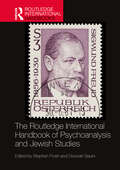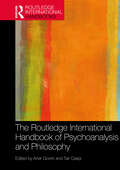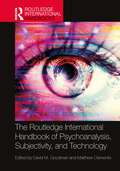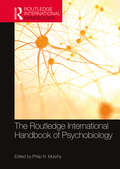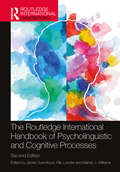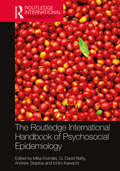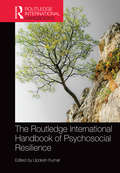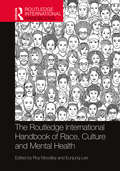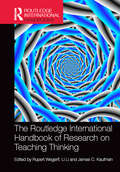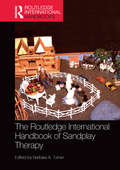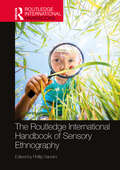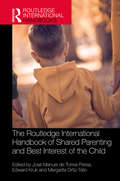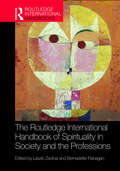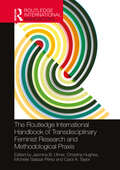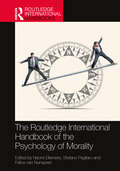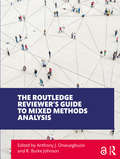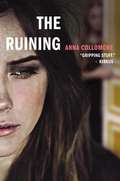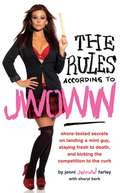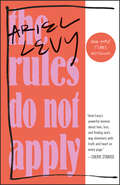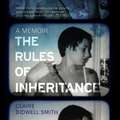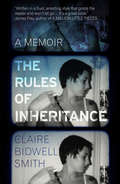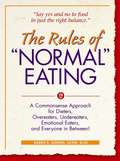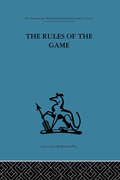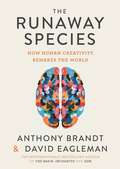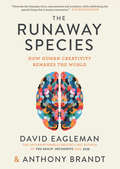- Table View
- List View
The Routledge International Handbook of Psychoanalysis and Jewish Studies (Routledge International Handbooks)
by Frosh StephenThe Routledge International Handbook of Psychoanalysis and Jewish Studies is an innovative, multidisciplinary volume covering the history, religion, culture and politics of Jewish Studies and psychoanalysis.An international team of contributors brings together these two fields and offers a critical assessment of the encounters that emerge from the confrontation and collaboration they have with each other. Chapters cover a broad range of topics, including psychoanalytic history, critical theory, film, ritual, Jewish heritage, the Bible, antisemitism, racism, life- writing and the occult.This Handbook will be of interest to practitioners and researchers in several interrelated disciplines, such as Jewish Studies, psychoanalysis, group analysis, sociology, anthropology, psychosocial studies, literature, film and gender studies. It will be of especial value to students of psychoanalytic and psychosocial studies.
The Routledge International Handbook of Psychoanalysis and Philosophy (Routledge International Handbooks)
by Aner Govrin Tair CaspiThe Routledge International Handbook of Psychoanalysis and Philosophy provides a rich panoramic view of what philosophy offers or disturbs in psychoanalysis and what it represents for psychoanalytic theory and practice. The thirty-three chapters present a broad range of interfaces and reciprocities between various aspects of psychoanalysis and philosophy. It demonstrates the vital connection between the two disciplines: psychoanalysis cannot make any practical sense if it is not entirely perceived within a philosophical context. Written by a team of world-leading experts, including established scholars, psychoanalysts and emerging talents, the Handbook investigates and discusses the psychoanalytic schools and their philosophical underpinning, as well as contemporary applied topics. Organized into five sections, this volume investigates and discusses how psychoanalysis stands in relation to leading philosophies such as Wittgenstein, Heidegger, Nietzsche, and Kant; philosophical perspectives on psychoanalytic schools such as Freud, Klein, Bion, Kohut, and Lacan; how psychoanalysis addresses controversial topics in philosophy such as truth, language and symbolism, ethics, and theories of mind. The last section addresses contemporary applied subjects in psychoanalytic thought: colonialism, gender, race, and ecology. This Handbook offers a novel and comprehensive outlook vital for scholars, philosophers, practicing psychoanalysts and therapists alike. The book will serve as a source for courses in psychoanalysis, philosophy of science, epistemology, ethics, semiotics, cognitive science, consciousness, gender, race, post-colonialism theories, clinical theory, Freud's studies, both in universities and psychoanalytic training programs and institutes.
The Routledge International Handbook of Psychoanalysis, Subjectivity, and Technology (Routledge International Handbooks)
by David M. GoodmanThe Routledge International Handbook of Psychoanalysis, Subjectivity, and Technology uniquely provides a comprehensive overview of human subjectivity in the technological age and how psychoanalysis can help us better understand human life. Presented in five parts, David M. Goodman and Matthew Clemente collaborate with an international community of scholars and practitioners to consider how psychoanalytic formulations can be brought to bear on the impact technology has had on the facets of human subjectivity. Chapters examine how technology is reshaping our understanding of what it means to be a human subject, through embodiment, intimacy, porn, political motivation, mortality, communication, interpersonal exchange, thought, attention, responsibility, vulnerability, and more. Filled with thought-provoking and nuanced chapters, the contributors approach technology from a diverse range of entry points but all engage through the lens of psychoanalytic theory, practice, and thought. This book is essential for academics and students of psychoanalysis, philosophy, ethics, media, liberal arts, social work, and bioethics. With the inclusion of timely chapters on the coronavirus pandemic and teletherapy, psychoanalysts in practice and training as well as other mental health practitioners will also find this book an invaluable resource.
The Routledge International Handbook of Psychobiology (Routledge International Handbooks)
by Philip N. MurphyThe Routledge International Handbook of Psychobiology provides authoritative, cutting-edge research across the range of areas that fall under the umbrella of psychobiology. The handbook comprises 30 chapters which are organized into seven sections: the physical environment; how psychobiological processes regulate how we respond and cope; stress and anxiety; managing and enhancing mood and cognition; substance use and misuse; sleep; and psychobiology and human development. Each of the chapters is authored by experienced and active researchers in their field who provide authoritative reviews of the latest developments in psychobiology. It is essential reading for both established researchers in the field of psychobiology, as well as advanced students wishing to learn more about both the historical foundations and latest developments in this rapidly growing field.
The Routledge International Handbook of Psycholinguistic and Cognitive Processes (Routledge International Handbooks)
by Jackie Guendouzi, Filip Loncke and Mandy J. WilliamsThis handbook provides a comprehensive overview of the theories of cognition and language processing relevant to the field of communication disorders. Thoroughly updated in its second edition, the book explores a range of topics and issues that illustrate the relevance of a dynamic interaction between both theoretical and applied clinical work. Beginning with the origins of language evolution, the authors explore a range of both developmental and acquired communication disorders, reflecting the variety and complexity of psycholinguistics and its role in extending our knowledge of communication disorders. The first section outlines some of the major theoretical approaches from psycholinguistics and cognitive neuroscience that have been influential in research focusing on clinical populations, while Section II features examples from researchers who have applied this body of knowledge to developmental disorders of communication. Section III features examples focusing on acquired language disorders, and finally, Section IV considers psycholinguistic approaches to gesture, sign language, and alternative and augmentative communication (AAC). The new edition features new chapters offering fresh perspectives, further reading recommendations and a new epilogue from Jackie Guendouzi. This valuable text serves as a single interdisciplinary resource for graduate and upper-level undergraduate students in cognitive neurosciences, psychology, communication sciences and disorders, as well as researchers new to the field of communication disorders or to psycholinguistic theory.
The Routledge International Handbook of Psychosocial Epidemiology (Routledge International Handbooks)
by Andrew Steptoe Ichiro Kawachi Mika Kivimäki David G. BattyThe health effects of psychosocial factors are a widely discussed and controversial topic. Do positive and negative emotions affect our risk of developing physical disease? Are depressive individuals more likely to have cancer than those with an optimistic outlook on life? And what is the role of IQ in staying healthy and recovering from disease? Importantly, can we improve our health and life expectancy by avoiding certain psychosocial risk factors and maximizing positive psychological well-being? These and other questions are the focus of psychosocial epidemiology, a discipline linking psychological, social and biological sciences. <P><P>The Routledge International Handbook of Psychosocial Epidemiology is the first book to map this growing discipline. Including contributions from many of the leading researchers in the field, it is divided into five sections: <li>Part I: Methodological challenges in studying psychosocial factors and health; <li>Part II: Psychosocial factors in the etiology and prognosis of chronic diseases; <li>Part III: Controversies in the psychosocial approach; <li>Part IV: Interventions and policy implications <li>Part V: Future research directions <P><P>Taking advantage of a huge growth in research in recent years, the book provides the reader with the essentials to evaluate the diverse set of studies on psychosocial factors and health that are published today, and describes study designs in this field of research, progress in judging the validity of epidemiological evidence, as well as challenges in translating evidence into action. <P><P>This is an important and timely book. Providing methodological rigour, critical analysis and the policy implications of this emerging field of study, The Routledge International Handbook of Psychosocial Epidemiology will be an invaluable resource for students and researchers within both behavioural and medical sciences, as well as policy makers and others working in health and social care.
The Routledge International Handbook of Psychosocial Resilience (Routledge International Handbooks)
by Updesh KumarPsychological resilience has emerged as a highly significant area of research and practice in recent years, finding applications with a broad range of different groups in many settings. Contemporary discourse is not limited to ways of effective coping with adversity but also introduces mechanisms that can lead to enhanced capacity after dealing with difficult circumstances and recognises the importance of enriching the field with varied perspectives. The Routledge International Handbook of Psychosocial Resilience is a comprehensive compendium of writings of international contributors that takes stock of the state-of-the-art in resilience theory, research and practice. The Routledge International Handbook of Psychosocial Resilience covers the many different trajectories that resilience research has taken in four parts. Part One delineates the ‘Conceptual Arena’ by providing an overview of the current state of theory and research, exploring biological, psychological, and socio-ecological perspectives and discussing various theoretical models of personal and social resilience. The ‘Psychosocial Correlates’ of resilience are discussed further in Part Two, from personal and personality correlates, socio-environmental factors and the contextual and cultural conditions conducive to resilient behaviour. In Part Three, ‘Applied Evidences’ are introduced in order to build upon the theoretical foundations in the form of several case studies drawn from varied contexts. Examples of resilient behaviour range from post-disaster scenarios to special operation groups, orphaned children, and violent extremism. Finally, Part Four, ‘Proposed Implications and Resilience Building’, sums up the issues involved in discussing post-traumatic growth, wellbeing and positive adaptation in the varied contexts of personal, familial, organizational and societal resilience. The volume provides a comprehensive overview of resilience theory, practice and research across disciplines and cultures, from varied perspectives and different populations. It will be a key reference for psychiatrists, psychologists, psychotherapists and psychiatric social workers in practice and in training as well as researchers and students of psychology, sociology, human development, family studies and disaster management.
The Routledge International Handbook of Race, Culture and Mental Health (Routledge International Handbooks)
by Moodley, Roy / Lee, EunjungThis handbook presents a thorough examination of the intricate interplay of race, ethnicity, and culture in mental health – historical origins, subsequent transformations, and the discourses generated from past and present mental health and wellness practices. The text demonstrates how socio-cultural identities including race, gender, class, sexual orientation, disability, religion, and age intersect with clinical work in a range of settings. Case vignettes and recommendations for best practice help ground each in a clinical focus, guiding practitioners and educators to actively increase their understanding of non-Western and indigenous healing techniques, as well as their awareness of contemporary mental health theories as a product of Western culture with a particular historical and cultural perspective. The international contributors also discuss ways in which global mental health practices transcend racial, cultural, ethnic, linguistic, and political boundaries. The Routledge International Handbook of Race, Culture and Mental Health is an essential resource for students, researchers, and professionals alike as it addresses the complexity of mental health issues from a critical, global perspective.
The Routledge International Handbook of Research on Teaching Thinking (Routledge International Handbooks of Education)
by James C. Kaufman Li Li Rupert WegerifThe Routledge International Handbook of Research on Teaching Thinking is a comprehensive guide to research on teaching thinking. Teaching thinking is key to growing a more successful economy, is needed for increased democratic engagement and is vital for the well-being of individuals faced with the complexity of a globalised world. However, there are questions about what we mean by ‘thinking’, how best to teach it and how best to assess it, and it is these questions that this handbook explores and addresses. Containing surveys and summaries of international, cutting-edge research on every aspect of teaching thinking in a range of contexts, the handbook is thorough in its delivery, examining many different approaches and methods to help readers understand what teaching thinking is and how we can best take this movement forward. Key topics include: • Theoretical perspectives on teaching thinking • Approaches for teaching thinking • Developing creative thinking • Developing critical thinking and metacognition • The assessment of thinking • Teaching thinking in the context of STEM • Collaborative thinking and new technology • Neuro-educational research on teaching thinking This book is an essential guide for policy-makers, teachers and researchers who are interested in teaching thinking
The Routledge International Handbook of Sandplay Therapy (Routledge International Handbooks)
by Barbara A. TurnerThe Routledge International Handbook of Sandplay Therapy provides a comprehensive overview of this therapeutic method, developed to provide a means of helping clients of all ages with mental suffering. The contributors, from a range of therapeutic and cultural backgrounds, demonstrate core theory and practice, and explore the implications of current neuroscientific research. The chapters illustrate the effectiveness of this seemingly simple psychotherapeutic tool in its contemporary applications. Split into six parts, this handbook considers: Sandplay therapy in medicine Sandplay with special populations Sandplay in analysis and general practice Adaptions of the Sandplay method in education Sandplay and the spirit Non-Jungian uses of the sand tray in therapeutic applications Unique in scope and breadth, this handbook will appeal to academics and students of Jungian psychotherapy, as well as occupational therapists, art and play therapists, and all clinicians using Sandplay therapy as part of their professional practice.
The Routledge International Handbook of Sensory Ethnography (Routledge International Handbooks)
by Phillip VanniniThe Routledge International Handbook of Sensory Ethnography reviews and expands the field and scope of sensory ethnography by fostering new links among sensory, affective, more-than-human, non-representational, and multimodal sensory research traditions and composition styles. From writing and film to performance and sonic documentation, the handbook reimagines the boundaries of sensory ethnography and posits new possibilities for scholarship conducted through the senses and for the senses. Sensory ethnography is a transdisciplinary research methodology focused on the significance of all the senses in perceiving, creating, and conveying meaning. Drawing from a wide variety of strategies that involve the senses as a means of inquiry, objects of study, and forms of expression, sensory ethnography has played a fundamental role in the contemporary evolution of ethnography writ large as a reflexive, embodied, situated, and multimodal form of scholarship. The handbook dwells on subjects like the genealogy of sensory ethnography, the implications of race in ethnographic inquiry, opening up ethnographic practice to simulate the future, using participatory sensory ethnography for disability studies, the untapped potential of digital touch, and much more. This is the most definitive reference text available on the market and is intended for advanced undergraduates, graduate students, and researchers in anthropology, sociology, and the social sciences, and will serve as a state-of-the-art resource for sensory ethnographers worldwide.
The Routledge International Handbook of Shared Parenting and Best Interest of the Child
by José ManuelThis multidisciplinary volume offers an essential, comprehensive study of perspectives on the scope and application of the best interests of the child and focuses mainly on its application in relation to child custody. With expert contributions from psychological, sociological and legal perspectives, it offers scientific analysis and debate on whether it should be the primary consideration in deciding child custody cases in cases of divorce or separation or whether it should be one of several primary considerations. It explores complex dilemmas inherent in shared parenting and whether the advantages it offers children are sufficient when compared to attributing custody to one parent and limiting visitation rights of the other. Offering a comprehensive analysis of this complex topic, chapters provide detailed insight into the current state of research in this area, as well as expert guidelines aimed at resolving the controversies when parents agree or disagree over their children’s living arrangements. Cutting-edge topics explored include: transnational shared parenting; alternative dispute resolution; breastfeeding parents; religious disputes between parents and the psychological, social and economic factors that affect shared parenting. The Routledge International Handbook of Shared Parenting and Best Interest of the Child will be essential reading for scholars and graduate students in law, psychology, sociology and economics interested in shared parenting and family law.
The Routledge International Handbook of Spirituality in Society and the Professions (Routledge International Handbooks)
by Laszlo Zsolnai Bernadette FlanaganIncreasingly, it is being recognized that spirituality, defined here as "a multiform search for a transcendent meaning of life that connects them to all living beings and brings them in touch with God or ‘Ultimate Reality,’" is an aspect of almost every sphere and aspect of social life. It appears in humanity’s dealings with nature, home and community, healing, economics and business, knowledge, and education. The Routledge International Handbook of Spirituality in Society and the Professions is a stimulating collection that summarizes the most important issues, frameworks, discussions, and problems relating to spiritually inspired activities in different fields of social life. The contributors explore how spirituality is a part of existence and present approaches and models for professionals working in diverse areas. Presented in seven parts, the book provides a full overview of current research and practice. Part II, "Facets of spirituality," explores topics including philosophy, psychology, theology, and culture. Part III, "Nature," looks at ecology, agriculture, cities, and tourism. Part IV, "Home and community," presents chapters on various life stages, disability, gender, and culture. Part V, "Healing," examines medicine, mental and physical health, and ill-health. In Part VI, "Economy, politics, and law," contributors discuss business, leadership and the workplace, peace, and policing. Part VII, "Knowledge and education," includes chapters on science, design, fashion, literature, and the arts. In the final part, "Way forward," the editors look to the future with a chapter on inter-spirituality and the renewal of social practices. Driven by contemporary research and new developments, this Handbook is an innovative and interdisciplinary collection that provides an essential overview of contemporary spirituality and society from an international selection of contributors. The Routledge International Handbook of Spirituality in Society and the Professions offers accessible, diverse, and engaging international research, and its scope will appeal to academics and students of a wide range of subjects, including aging and addiction, psychology, theology, religious studies, sociology, business studies, and philosophy. It will also be an important work for professionals in medical and social services, the clergy, education, business, the arts, religious communities, and politics, and members of organizations looking at the links between spirituality, religion, and society.
The Routledge International Handbook of Transdisciplinary Feminist Research and Methodological Praxis
by Carol A. Taylor Christina Hughes Michelle Salazar Pérez Jasmine B. UlmerThe Routledge International Handbook of Transdisciplinary Feminist Research and Methodological Praxis is organized around ways of doing fair and just research, with deliberate transdisciplinary overlap in each of the sections so as to share and demonstrate potential opportunities for lasting alliances.Authors and artists address topics that include the doing of original transdisciplinary research and engaging multiple communities in research; mentoring from both academic and community-based perspectives; creating and maintaining collaborative relationships; managing personal, professional, and financial challenges; addressing writing blocks and feelings of being overwhelmed; and experiences of care and joy. The range of feminist work invoked in this volume include, but are not limited to: intersectional feminisms, abolitionist feminism, Black feminism, Womanism, Chicana feminism, Latina feminism, BIPOC feminisms, Indigenous feminism, decolonial and postcolonial feminism, transnational feminism, gender and sexuality studies, queer feminism, trans feminisms, poststructural feminism, posthuman and more-than-human feminism, materialist feminism, crip feminism, feminist disability studies, quantum feminism, sonic feminisms, feminist science studies, science and technology studies, or STS, and more.From advanced graduate students to seasoned scholars, this volume presents timely knowledge and will be useful as a substantive guide to round out understandings of multiple approaches to feminist research.
The Routledge International Handbook of the Psychology of Morality (Routledge International Handbooks)
by Naomi Ellemers Stefano Pagliaro Félice Van NunspeetThis cutting-edge handbook examines moral psychology and behavior, uncovering layers of human morality through a comprehensive overview of topics and approaches. Featuring an array of expert international contributors, the book addresses five key themes: moral reasoning, moral judgments, moral emotions, moral behavior and moral self-views. Each section includes empirical chapters that address these themes at the intrapersonal, interpersonal, intragroup or intergroup level. Each section starts with a reflective chapter from a leading scholar in this field of study who shares their personal vision on key issues and future developments. Drawing on emerging research and featuring real-world examples, the book offers a deeper understanding of the social psychological factors that shape our moral behavior and how this plays out in our daily lives. The Routledge International Handbook of the Psychology of Morality will be essential reading for academics and students in social psychology, the psychology of morality, business ethics and related areas. It will also be a compelling resource for legal and HR professionals, policy makers and anyone interested in understanding the complex and multi-faceted nature of human morality.
The Routledge Reviewer’s Guide to Mixed Methods Analysis
by Anthony J. Onwuegbuzie R. Burke JohnsonThe Routledge Reviewer’s Guide to Mixed Methods Analysis is a groundbreaking edited book – the first devoted solely to mixed methods research analyses, or mixed analyses. Each of the 30 seminal chapters, authored by internationally renowned scholars, provides a simple and practical introduction to a method of mixed analysis. Each chapter demonstrates "how to conduct the analysis" in easy-to-understand language. Many of the chapters present new topics that have never been written before, and all chapters offer cutting-edge approaches to analysis. The book contains the following four sections: Part I Quantitative Approaches to Qualitative Data (e.g., factor analysis of text, multidimensional scaling of qualitative data); Part II Qualitative Approaches to Quantitative Data (e.g., qualitizing data, mixed methodological discourse analysis); Part III "Inherently" Mixed Analysis Approaches (e.g., qualitative comparative analysis, mixed methods social network analysis, social media analytics as mixed analysis, GIS as mixed analysis); and Part IV Use of Software for Mixed Data Analysis (e.g., QDA Miner, WordStat, MAXQDA, NVivo, SPSS). The audience for this book includes (a) researchers, evaluators, and practitioners who conduct a variety of research projects and who are interested in using innovative analyses that will allow them to extract more from their data; (b) academics, including faculty who would use this book in their scholarship, as well as in their graduate-level courses, and graduate students who need access to a comprehensive set of mixed analysis tools for their dissertations/theses and other research assignments and projects; and (c) computer-assisted data analysis software developers who are seeking additional mixed analyses to include within their software programs. Chapter 24 of this book is freely available as a downloadable Open Access PDF at http://www.taylorfrancis.com under a Creative Commons Attribution-Non Commercial-No Derivatives (CC-BY-NC-ND) 4.0 license.
The Ruining
by Anna CollomoreAnnie Phillips is thrilled to leave her past behind and begin a shiny new life on Belvedere Island, as a nanny for the picture-perfect Cohen family. In no time at all, she falls in love with the Cohens, especially with Libby, the beautiful young matriarch of the family. Life is better than she ever imagined. She even finds romance with the boy next door. All too soon, cracks appear in Annie's seemingly perfect world. She's blamed for mistakes she doesn't remember making. Her bedroom door comes unhinged, and she feels like she's always being watched. Libby, who once felt like a big sister, is suddenly cold and unforgiving. As she struggles to keep up with the demands of her new life, Annie's fear gives way to frightening hallucinations. Is she tumbling into madness, or is something sinister at play? The Ruining is a complex ride through first love, chilling manipulation, and the terrifying depths of insanity.
The Rules According to JWOWW: Shore-Tested Secrets on Landing a Mint Guy, Staying Fresh to Death, and Kicking the Competition to the Curb
by Sheryl Berk Jenni "JWOWW" FarleyOne of the stars of MTV’s smash hit series The Jersey Shore, Jennifer “JWOWW” Farley lays down The Rules According to JWOWW, offering a new spin on the dos and don’ts of dating, from “smushing” guys to avoiding booty calls to finding the guy of your dreams. The book includes empowering advice for a new generation of self-assured young women, as JWOWW shares her “shore-tested secrets on landing a mint guy, staying fresh to death, and kicking the competition to the curb.”
The Rules Do Not Apply: A Memoir
by Ariel LevyA gorgeous memoir about a woman overcoming dramatic loss and finding reinvention—for readers of Cheryl Strayed and Joan Didion When thirty-eight-year-old New Yorker writer Ariel Levy left for a reporting trip to Mongolia in 2012, she was pregnant, married, financially secure, and successful on her own terms. A month later, none of that was true. Levy picks you up and hurls you through the story of how she built an unconventional life and then watched it fall apart with astonishing speed. Like much of her generation, she was raised to resist traditional rules—about work, about love, and about womanhood. “I wanted what we all want: everything. We want a mate who feels like family and a lover who is exotic, surprising. We want to be youthful adventurers and middle-aged mothers. We want intimacy and autonomy, safety and stimulation, reassurance and novelty, coziness and thrills. But we can’t have it all.” In this profound and beautiful memoir, Levy chronicles the adventure and heartbreak of being “a woman who is free to do whatever she chooses.” Her own story of resilience becomes an unforgettable portrait of the shifting forces in our culture, of what has changed—and of what is eternal. Advance praise for The Rules Do Not Apply“I read The Rules Do Not Apply in one long, rapt sitting. Unflinching and intimate, wrenching and revelatory, Ariel Levy’s powerful memoir about love, loss, and finding one’s way shimmers with truth and heart on every page.”—Cheryl Strayed “Every deep feeling a human is capable of will be shaken loose by this profound book. Ariel Levy has taken grief and made art out of it.”—David Sedaris “Ariel Levy is a writer of uncompromising honesty, remarkable clarity, and surprising humor gathered from the wreckage of tragedy. Her account of life doing its darnedest to topple her, and her refusal to be knocked down, will leave you shaken and inspired. I am the better for having read this book.”—Lena Dunham “A great memoir is not a trip through someone else’s life but a series of long looks into your own. Ariel Levy’s book—grieving, hopeful, painful, funny—is that.”—Amy Bloom “It’s become a truism that feminists are living out our mothers’ unlived lives. But Ariel Levy seems to be living out the unlived lives of an entire generation of women, simultaneously. Free to do whatever she chooses, she chooses everything. While reinventing work, marriage, family, pregnancy, sex, and divorce for herself from the ground up, Levy experiences devastating loss. And she recounts it all here with searing intimacy and an unsentimental yet openhearted rigor.”—Alison Bechdel “The Rules Do Not Apply is heartbreaking, brilliant, and disarming, the kind of book that may change you. Ariel Levy writes with a beauty that is ferociously honest and with the fervor of an explorer. No one else has written so insightfully about the current legacy of feminism’s ‘lavish gift’ of freedom. Levy has a voice unlike any other. This is a devastating and inspired book.”—René Steinke
The Rules of Inheritance
by Claire Bidwell SmithIn this astonishing debut, Claire Bidwell Smith, an only child, is just fourteen years old when both of her charismatic parents are diagnosed with cancer. What follows is a coming-of-age story that is both heartbreaking and exhilarating. As Claire hurtles towards loss she throws herself at anything she thinks might help her cope with the weight of this harsh reality: boys, alcohol, traveling, and the anonymity of cities like New York and Los Angeles. By the time she is twenty-five years old they are both gone and Claire is very much alone in the world. Claire's story is less of a tragic tale and more of a remarkable lesson on how to overcome some of life's greatest hardships. Written with suspense and style, and bursting with love and adventure, The Rules of Inheritance vividly captures the deep grief and surprising light of a young woman forging ahead on a journey of loss that humbled, strengthened, and ultimately healed her.(P)2013 Headline Digital
The Rules of Inheritance: A Memoir
by Claire Bidwell SmithClaire Bidwell Smith, an only child, is just fourteen years old when both of her charismatic parents are diagnosed with cancer. What follows is a coming-of-age story that is both heartbreaking and exhilarating. As Claire hurtles towards loss she throws herself at anything she thinks might help her cope with the weight of this harsh reality: boys, alcohol, traveling, and the anonymity of cities like New York and Los Angeles. By the time she is twenty-five years old both her parents are gone and Claire is very much alone in the world. Claire's story is less of a tragic tale and more of a remarkable lesson on how to overcome some of life's greatest hardships. Written with suspense and style, and bursting with love and adventure, The Rules of Inheritance vividly captures the deep grief and surprising light of a young woman forging ahead on a journey of loss that humbled, strengthened, and ultimately healed her.
The Rules of Normal Eating: A Commonsense Approach for Dieters, Overeaters, Undereaters, Emotional Eaters, and Everyone in Between!
by Karen R. KoenigHere is a book for all eaters who yearn to improve their relationship with food. It gives the answers to what struggling overeaters, undereaters, and chronic dieters all want to know: how to be comfortable around food and find true pleasure in eating. Written in easy-to-understand every day language, The Rules of "Normal" Eating lays out the four basic rules that "normal" eaters follow instinctively-eating when they're hungry, choosing foods that satisfy them, eating with awareness and enjoyment, and stopping when they're full or satisfied. Along with specific skills and techniques which help promote change, The Rules of "Normal" Eating presents a powerful, proven cognitive-behavioral model of transformation that targets beliefs, feelings, and behaviors about food and eating and moves the reader toward genuine physical and emotional fulfillment. Readers will learn how to reprogram their dysfunctional beliefs about food and eating, manage uncomfortable feelings without turning to food, and establish new eating habits that tune their bodies in to natural sensations of hunger, pleasure, satisfaction and satiation. Chocked full of humorous insights, compassion, and practical wisdom gleaned from a therapist and educator who used to diet and binge with the best of them, this book teaches the reader how to think and behave around food the way that "normal" eaters do. The Rules of "Normal" Eating digs deep and addresses how under- and overeaters can overcome the underlying conflicts that often plague and prevent them from becoming "normal" eaters-difficulty sensing what is enough for them, holding onto a mindset of deprivation and self-denial, feeling undeserving of genuine pleasure, and a lack of awareness and skill for effective emotional and physical self-re.
The Rules of the Game: Interdisciplinarity, transdisciplinarity and analytical models in scholarly thought
by Teodor ShaninTavistock Press was established as a co-operative venture between the Tavistock Institute and Routledge & Kegan Paul (RKP) in the 1950s to produce a series of major contributions across the social sciences. This volume is part of a 2001 reissue of a selection of those important works which have since gone out of print, or are difficult to locate. Published by Routledge, 112 volumes in total are being brought together under the name The International Behavioural and Social Sciences Library: Classics from the Tavistock Press. Reproduced here in facsimile, this volume was originally published in 1972 and is available individually. The collection is also available in a number of themed mini-sets of between 5 and 13 volumes, or as a complete collection.
The Runaway Species: How Human Creativity Remakes the World
by Anthony Brandt David EaglemanThe Runaway Species is a deep dive into the creative mind, a celebration of the human spirit, and a vision of how we can improve our future by understanding and embracing our ability to innovate. David Eagleman and Anthony Brandt seek to answer the question: what lies at the heart of humanity’s ability―and drive―to create? <P><P>Our ability to remake our world is unique among all living things. But where does our creativity come from, how does it work, and how can we harness it to improve our lives, schools, businesses, and institutions? <P><P>Eagleman and Brandt examine hundreds of examples of human creativity through dramatic storytelling and stunning images in this beautiful, full-color volume. By drawing out what creative acts have in common and viewing them through the lens of cutting-edge neuroscience, they uncover the essential elements of this critical human ability, and encourage a more creative future for all of us.
The Runaway Species: How human creativity remakes the world
by Anthony Brandt David Eagleman&“The authors look at art and science together to examine how innovations—from Picasso&’s initially offensive paintings to Steve Jobs&’s startling iPhone—build on what already exists and rely on three brain operations: bending, breaking and blending. This manifesto . . . shows how both disciplines foster creativity.&” —The Wall Street JournalThe Runaway Species is a deep dive into the creative mind, a celebration of the human spirit, and a vision of how we can improve our future by understanding and embracing our ability to innovate. David Eagleman and Anthony Brandt seek to answer the question: what lies at the heart of humanity&’s ability—and drive—to create?Our ability to remake our world is unique among all living things. But where does our creativity come from, how does it work, and how can we harness it to improve our lives, schools, businesses, and institutions?Eagleman and Brandt examine hundreds of examples of human creativity through dramatic storytelling and stunning images in this beautiful, full–color volume. By drawing out what creative acts have in common and viewing them through the lens of cutting–edge neuroscience, they uncover the essential elements of this critical human ability, and encourage a more creative future for all of us.&“The Runaway Species approach[es] creativity scientifically but sensitively, feeling its roots without pulling them out.&” —The Economist
